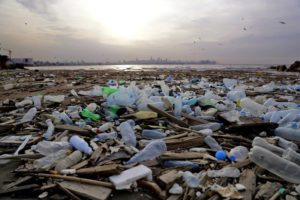The world generates around 3.5 million tons of plastic and other solid waste a day which has a significant impact on resource depletion, global warming and pollution. Reducing how much waste we throw away can help reduce pollution and use resources more efficiently.
To tackle this issue in the UK, new legislation brought in via the Resources and Waste Strategy (RWS) will make businesses fully responsible for paying the full cost of disposing of any packaging they place on the market. Not only will there be a UK-wide tax on plastic packaging products with less than 30% recycled content, but businesses will also be responsible for the costs of collecting, recycling or disposing of all the packaging waste they give to consumers. Additionally, the RWS proposes to improve consistency in waste and recycling collections, as well as introduce a deposit return scheme on drinks containers. From boxes and bottles, to coat hangers and carrier bags, it’s time to start being mindful of your waste and reduce what you throw away.
On a regional level, the London Environment Strategy aims to achieve a 65% municipal waste recycling rate for London’s waste, as well as reach a 50% reduction in food waste and packaging use per person by 2030.
The collection of waste and recycling is reliant on trucks taking it from the point of generation to the point of treatment or disposal. These trucks normally run on diesel which is notorious for creating air pollution. With Westminster suffering from some of the worst air pollution levels in Europe, your business can take easy and straightforward actions to reduce the impact of waste collections on our poor air quality.
How can your business get started with reducing waste?
One of the best ways to reduce waste is to try to avoid it altogether and devise innovative ways to reduce, reuse and recycle. The major benefit of avoiding waste is that it can save you money from buying new replacement goods and from having to pay to get waste collected. Reducing waste generation and incorporating waste reduction procedures in your business model can be done through some of the following examples:

- Be aware of what exactly you throw away and what is in your waste
- Only buy what you need and avoid duplicating orders
- Buy in bulk where possible and avoid individually packaged items
- Avoid single-use items such as single-portion servings, bottles, plates, cups, and cutlery in catering operations
- Buy low-waste products that come with little to no packaging. Opt for using recycled materials
- Use refillable toiletries such as soap, shampoo and shower gel dispensers, and replace single-use items such as paper towels and wipes with hand dryers, textile towels or cloths
- Work with your suppliers to cut down on single-use cardboard boxes, pallets and crates. Look into reusable alternatives such as crates and totes
- Stop using disposable items such as stationary, coat hangers, shrink wrap or double layers of packaging
- Print double-sided or go paperless using electronic or online means of communication to reduce paper waste
- Reduce energy usage with energy-efficient appliances and switching them off when not in use
- Use intranets, cloud-based file-sharing platforms, online forums or applications for sharing information rather than distributing hard copy documents
- Share office equipment between the people on your floor or building rather than buy new furniture or equipment for each individual person
- Donate your used office furniture to local charities such as the British Heart Foundation
- Avoid leftover food from hospitality or catering operations. Track and measure food waste in your organisation so it can be better managed
- Segregate your waste streams instead of throwing everything away as general waste
Use our collection services with zero and low emission vehicles to reduce vehicle movements and air pollution. Our eRCV (electric refuse collection vehicle) project was even recognised at the 2020 LAPV Future Fleet Awards as the most sustainable fleet management department
What can you expect in our waste reduction guide?
How to:
- Reduce over-ordering goods and consumables
- Reuse items others would appreciate (i.e. office furniture)
- Stop wasting food
- Stop wasting paper
- Stop waste coming in through the mail
- Segregate different waste materials
- Stop using inefficient waste collection by other providers
- Stop incurring waste fines
- Stop sending your waste and recycling abroad
This was simply an introduction to what you can find in ‘9 quick tips for reducing waste to save time, money and the environment.’ Read the guide to discover how you can be more responsible when it comes to your waste and recycling management.





